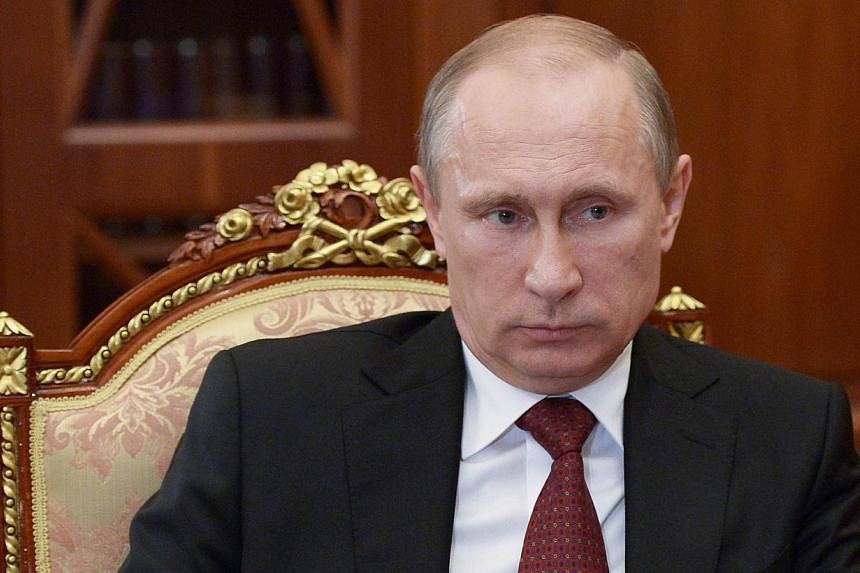SIVERSK (Ukraine) (AFP) - Ukraine's new Western-backed leader and Russian President Vladimir Putin have both called for dialogue to end a pro-Moscow uprising that has threatened the former Soviet state's survival and brought Europe to the edge of war.
The twin calls on Sunday from the central figures of the worst East-West crisis since the Cold War era came with the ragtag militias in Ukraine's eastern rustbelt showing no desire to end their independence drive.
Ukrainian President Petro Poroshenko - who will crown his May 25 election promise by signing a historic EU trade pact in Brussels on Friday that pulls Kiev further out of the Kremlin's reach - called a peaceful settlement "our plan A".
"But those who are planning to use peaceful negotiations only to buy time and regroup their forces must know that we have a detailed plan B. I am not going to speak of it now because I believe that our peaceful plan will work out," he said in a 12-minute television address.
The 48-year-old confectionery tycoon added that he had no intention of negotiating with those implicated in "murder and torture".
Mr Putin promised to stand behind Mr Poroshenko's peace efforts as long as they led to "substantial dialogue" and resulted in ethnic Russians winning broader language and other civil rights.
The Ukraine crisis will dominate an EU foreign ministers' meeting in Luxembourg on Monday amid uncertainty about Russia's real intentions just days before Brussels signs the historic association accord with Kiev.
Ukraine Foreign Minister Pavlo Klimkin will attend the Luxembourg meeting, chaired by EU foreign affairs head Catherine Ashton, and will be closely listened to, EU officials said.
However, the separatist fighters in eastern Ukraine were showing little interest in the diplomatic efforts to resolve the crisis.
"Both of my grandfathers were killed in World War II fighting the Nazis," said a rebel named Andriy as he prepared ammunition for a heavy machine gun in his battle against what many separatists refer to as the "fascist" in power in Kiev today.
"I will continue their fight," the 31-year-old said.
Ukraine's border guards reported three raids by the rebels in the eastern Lugansk region on Sunday that followed similar attacks the day before.
Leaders in the self-proclaimed Donetsk People's Republic reaffirmed that the "ceasefire unilaterally declared by the Ukrainian military without any coordination with us is not recognised by (our) militia."
But Mr Putin took the extra step on Saturday to call on "the conflicting parties to halt all military activities and sit down at the negotiating table" - a comment that implied a degree of criticism for the rebels' continued attacks.
The Kremlin chief has been sending mixed signals to Kiev that included a surprise order on Saturday for Russian forces stretching from the Volga to western Siberia to go on "full combat alert".
Some analysts see this as a bid by Mr Putin - still stunned at seeing months of deadly pro-EU protests lead to the February ouster of a Kremlin-backed president - to unsettle the new pro-Western team and keep reins on the Russified south-east while avoiding new Western sanctions.
French President Francois Hollande's office said he and German Chancellor Angela Merkel urged Mr Putin in a three-way call on Sunday "to promote the resumption of negotiations".
Mr Poroshenko told US Vice-President Joe Biden on Sunday that the Russian-backed separatists continue to attack Ukrainian forces despite Kiev's unilateral ceasefire declaration, the White House said.
In a phone call, Mr Biden, welcoming the declaration, "expressed concern that separatist leaders have refused to reciprocate," the statement added.
And, in a warning to the Kremlin, Mr Biden said Washington was "working closely with its G7 partners to prepare further economic sanctions against Russia if Moscow did not take actions as described in the G7 leaders declaration to stop the flow of arms and militants across the border and use its influence to publicly call on the separatists to lay down their arms".
Mr Poroshenko, in his television statement, addressed another top Putin priority by vowing to enshrine in the constitution locals' right to use the Russian language in schools and official business.
And he confirmed plans to establish a 10km buffer zone along the Russian border to stem the flow of weapons and gunmen from Ukraine's giant neighbour.
Both Kiev and its Western allies are anxious about the presence of new Russian forces along the frontier amid charges of increasingly large flows of heavy weapons crossing into rebel-held parts of the east.
Ukrainian officials have told European Union and G7 teams in Kiev that they had evidence of 10 additional tanks and sealed trucks coming over the border close to the eastern city of Lugansk since Thursday.
US State Department spokeswoman Jen Psaki noted that most of the equipment being gathered in southwest Russia was no longer used by its military.
"We believe that Russia may soon provide this equipment to separatist fighters," Ms Psaki said.

